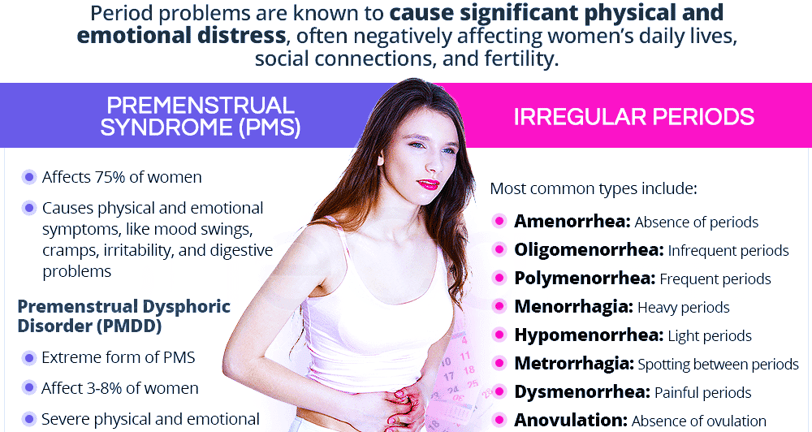Women's Menstrual Period Disorders: Causes, Symptoms, and Treatment Options
Learn about the causes, symptoms, and treatment options for understanding women's menstrual period disorders. Explore effective solutions for managing this common health issue.
HEALTH


Causes of Menstrual Period Disorders
Menstrual period disorders can arise from a myriad of factors, ranging from physiological and hormonal imbalances to lifestyle influences and underlying health conditions. Understanding these causes can aid in identifying and managing menstrual irregularities effectively.
Physiological changes are a primary contributor to menstrual disorders. Hormonal fluctuations, particularly involving estrogen and progesterone, play a pivotal role in regulating the menstrual cycle. Disruptions in these hormones can lead to conditions such as amenorrhea (absence of menstruation) or menorrhagia (heavy menstrual bleeding).
Among the common underlying health conditions, polycystic ovary syndrome (PCOS) and endometriosis significantly impact menstrual health. PCOS leads to the development of multiple ovarian cysts due to hormonal imbalance, often resulting in irregular or prolonged menstrual periods. Endometriosis, characterized by the presence of the uterine lining outside the uterus, can cause severe menstrual pain and heavy bleeding. Both conditions are prevalent among women of reproductive age and require medical attention for proper management.
Thyroid disorders, including hypothyroidism and hyperthyroidism, also affect menstrual cycles. The thyroid gland's hormones regulate various body functions, including the menstrual cycle. Any disturbances can lead to delayed or excessively frequent periods. Uterine fibroids, non-cancerous growths in the uterus, may cause heavy bleeding and prolonged menstrual cycles, further complicating menstrual health.
Lifestyle factors significantly influence menstrual regularity. High levels of stress can disturb the hormonal equilibrium, leading to irregular periods. Significant weight fluctuations, whether weight gain or loss, impact estrogen levels and menstrual patterns. Additionally, extreme physical activity, often seen in athletes, can suppress the reproductive system, causing menstrual irregularities.
Birth control methods and certain medications are other notable factors. Hormonal contraceptives, while typically used to regulate menstrual cycles, can initially cause disturbances. Non-hormonal medications, such as anticoagulants or antipsychotics, can also interfere with menstrual regularity. A comprehensive understanding of these diverse causes is essential in addressing and treating menstrual period disorders effectively.
Symptoms of Menstrual Period Disorders
Menstrual period disorders encompass a variety of symptoms that can significantly affect a woman's quality of life. Among the most prominent signs are irregular periods, which include variations in the cycle length and the nature of the menstrual flow. Women may experience heavy bleeding (menorrhagia), characterized by abnormally heavy or prolonged menstrual periods. On the other end of the spectrum, light (oligomenorrhea) or infrequent periods may also be observed, wherein menstrual cycles exceed 35 days. In some cases, the complete absence of menstruation (amenorrhea) can occur, either due to natural physiological changes or underlying health issues.
Physical symptoms of menstrual period disorders often include severe menstrual pain (dysmenorrhea), which can manifest as intense cramping in the lower abdomen, back, or even the thigh region. This pain can be debilitating, hindering routine activities and reducing overall productivity. Other physical manifestations include bloating, a sensation of fullness or swelling in the abdomen, and fatigue, an overwhelming sense of tiredness that can detract from daily functions.
Emotionally, these disorders can trigger a range of symptoms such as mood swings, irritability, and heightened emotional sensitivity. The hormonal fluctuations associated with menstrual cycles can exacerbate these emotional symptoms, causing distress and affecting interpersonal relationships. Such emotional disturbances, coupled with physical discomfort, can lead to a diminished quality of life.
It is essential for women to recognize the impact of these symptoms on their daily lives. Persistent or severe symptoms warrant professional medical evaluation. Consulting with a healthcare provider can facilitate the identification of the underlying causes of menstrual period disorders and the development of an appropriate treatment plan. Timely medical attention ensures that women can find relief from bothersome symptoms and maintain a balanced, healthy lifestyle.
Treatment Options for Menstrual Period Disorders
Treatment options for menstrual period disorders vary depending on the specific condition and its severity. Medical interventions often include hormonal therapies, which play a crucial role in regulating menstrual cycles. Commonly, birth control pills are prescribed to manage symptoms such as heavy bleeding, irregular periods, or premenstrual syndrome (PMS). For conditions like polycystic ovary syndrome (PCOS) or thyroid dysfunction, healthcare providers may recommend specific medications aimed at addressing the underlying hormonal imbalances.
In cases where medical treatments are insufficient or inappropriate, surgical options may be considered. For instance, individuals suffering from severe endometriosis or large fibroids might benefit from procedures like laparoscopy or hysterectomy. These interventions are designed to relieve symptoms by removing or destroying abnormal tissue, thereby improving quality of life. However, the decision to proceed with surgery is typically made after careful consideration and consultation with a healthcare specialist.
Apart from medical and surgical interventions, lifestyle modifications are pivotal in managing menstrual period disorders. Stress management techniques, such as mindfulness, yoga, or therapy, can alleviate symptoms by promoting overall mental well-being. Additionally, maintaining a balanced diet that is rich in essential nutrients and vitamins contributes to hormonal balance and general health. Regular exercise aids in weight management, which is particularly beneficial for individuals with PCOS, as excess weight can exacerbate symptoms. Ensuring a healthy lifestyle can ameliorate symptoms and enhance the effectiveness of medical treatments.
It is imperative to consult with a healthcare provider to develop a personalized treatment plan. Every individual's body responds differently to various therapies, and a tailored approach ensures optimal outcomes. Whether opting for medical treatments, surgical interventions, or lifestyle changes, professional guidance is essential in navigating the complexities of menstrual period disorders.
